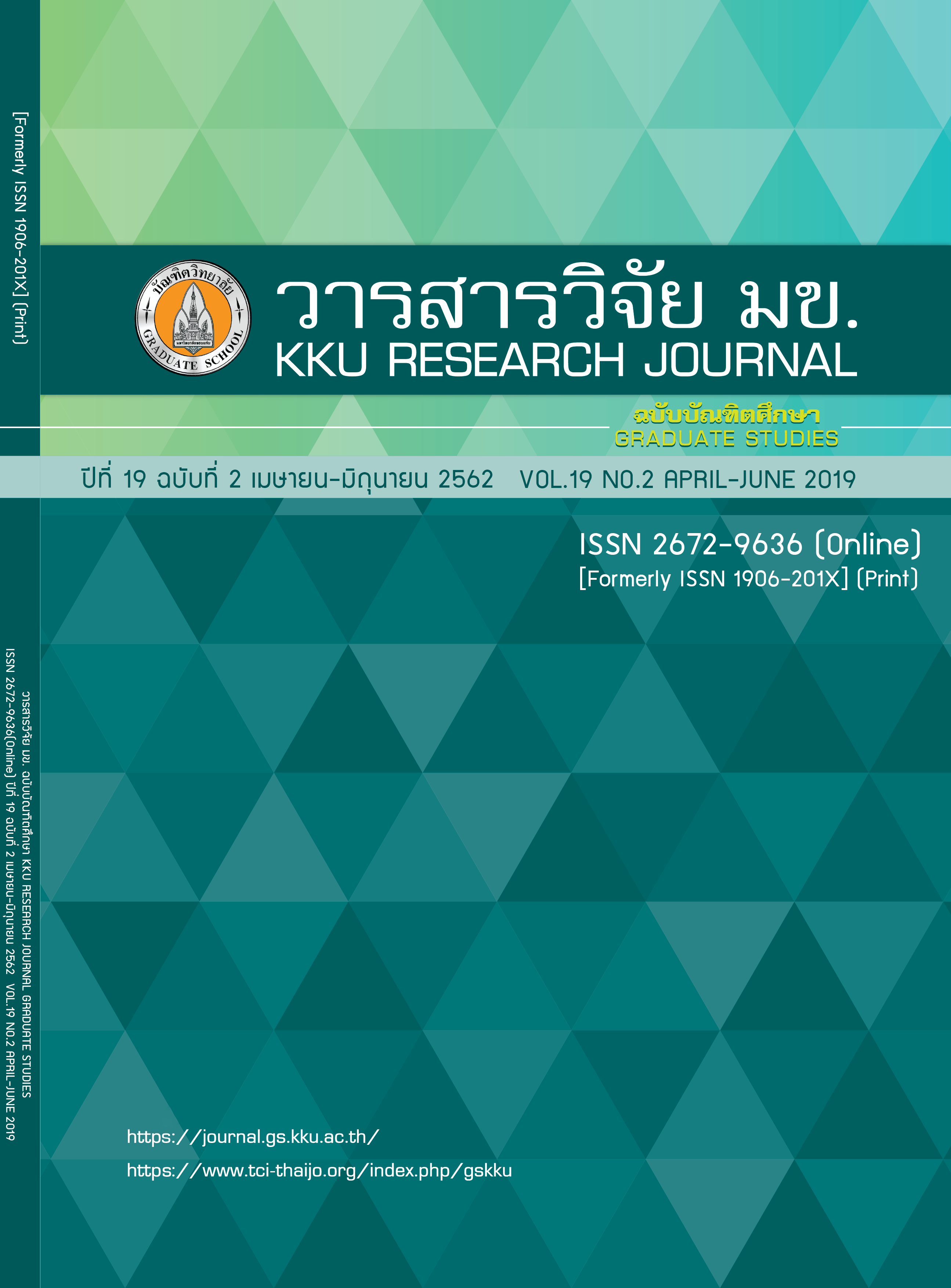Bio-oil Production From Co-Pyrolysis of Plastic Wastes and Sugarcane Leaves Under Spent DCC Catalyst
Keywords:
: Co-pyrolysis, Co-pyrolysis, Bio-oil, Spent deep catalytic crackingAbstract
This research aims to study the co-pyrolysis of plastic waste and sugarcane leaves by operating in a horizontal fixed bed reactor heated by an electrical furnace. The pyrolysis conditions were the weight ratio of plastic waste to sugarcane leaves (P:B) of 0:1 1:0 1:1 3:1 and 1:3, spent DCC catalyst amount of 0-20wt% and maintaining for 3 h at a pyrolysis temperature of 400-600°C. It was found that thermal degradation depended on the material ratio and the pyrolysis temperature. The noncatalytic co-pyrolysis of 3:1 (P:B) gave high liquid product yield of 47.67wt%. Addition of catalyst in co-pyrolysis decreased the liquid product yield. However, FTIR curves of liquid product from co-pyrolysis showed similarities with those of commercial diesel and gasoline. Liquid products with high heating values of 78.23 and 85.97 MJ/kg were obtained from the co-pyrolysis of 3:1 (P:B) at 600°C with catalyst amount of 5 and 10wt%, respectively. GC-MS analysis showed that the liquid product obtained from the co-pyrolysis at 600°C for the 1:1 (P:B) and 3:1 (P:B) with the 5 and 10wt% catalyst, respectively, increased the light aliphatic hydrocarbon distribution of the range C9-C21.
References
2. Anuar Sharuddin SD, Abnisa F, Wan Daud WMA, Aroua MK. A review on pyrolysis of plastic wastes. Energy Conversion and Management. Pergamon. 2016; 115: 308-326.
3. Gollakota ARK, Reddy M, Subramanyam MD, Kishore N. A review on the upgradation techniques of pyrolysis oil. Renewable and Sustainable Energy Reviews. Pergamon. 2016; 58: 1543-1568.
4. Jitkarnka S. Bio-oil from plastic waste and tire old. Petroleum and Petrochemical College. 2010; 1-8. Thai.
5. Kim H, Choi SJ, Kim JM, Jeon JK, Park SH, Jung SC, et al. Catalytic copyrolysis of particle board and polypropylene over Al-MCM-48. Mater Res Bull. 2016; 82: 61-66.
6. Bhattacharya P, Steele PH, Hassan EBM, Mitchell B, Ingram L, Pittman CU. Wood/plastic copyrolysis in an auger reactor: Chemical and physical analysis of the products. Fuel. 2009; 88(7): 1251-1260.
7. Chen GB, Li YH, Chen GL, Wu WT. Effects of catalysts on pyrolysis of castor meal. Energy. 2017; 119: 1-9.
8. Cordero-Lanzac T, Palos R, Arandes JM, Castaño P, Rodríguez-Mirasol J, Cordero T, et al. Stability of an acid activated carbon based bifunctional catalyst for the raw bio-oil hydrodeoxygenation. Appl Catal B Environ. 2017; 203: 389-399.
9. Naqvi SR, Uemura Y, Yusup SB. Catalytic pyrolysis of paddy husk in a drop type pyrolyzer for bio-oil production: The role of temperature and catalyst. J Anal Appl Pyrolysis. 2014; 106: 57-62.
10. Jutakridsada P, Sriprasoed R, Patikarnmonthon N, Kamwilaisak K. Comparison Study of Sugarcane Leaves and Corn Stover as a Potential Energy Source in Pyrolysis Process. Energy Procedia. 2016; 100: 26-29.
11. Chattopadhyay J, Pathak TS, Srivastava R, Singh AC. Catalytic co-pyrolysis of paper biomass and plastic mixtures (HDPE (high density polyethylene), PP (polypropylene) and PET (polyethylene terephthalate)) and product analysis. Energy. 2016; 103: 513-521.
12. Chen W, Shi S, Zhang J, Chen M, Zhou X. Co-pyrolysis of waste newspaper with high-density polyethylene: Synergistic effect and oil characterization. Energy Convers Manag. 2016; 112: 41-48.
13. Zhou P. Deep catalytic cracking (DCC) technology. Petrochemical Technol. 1997; 26(8).
14. Uzun BB, Apaydin-Varol E, Ateş F, Özbay N, Pütün AE. Synthetic fuel production from tea waste: Characterisation of bio-oil and bio-char. Fuel. 2010; 89(1): 176-184.
15. Dewangan A, Pradhan D, Singh RK. Co-pyrolysis of sugarcane bagasse and low-density polyethylene: Influence of plastic on pyrolysis product yield. Fuel. 2016; 185: 508-516.



